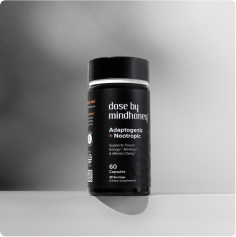The Power of BDNF (Brain-Derived Nootropic Factor)

Harnessing the Power of BDNF (Brain-Derived Nootropic Factor) for Cognitive Enhancement
Introduction
In the realm of cognitive enhancement and brain health, a fascinating molecule has gained attention in recent years: Brain-Derived Nootropic Factor, or BDNF. BDNF is a protein that plays a crucial role in the development and maintenance of healthy brain function.
In this blog, we'll explore what BDNF is, its significance, and how you can boost its levels to enhance your cognitive abilities.
Understanding BDNF
BDNF, also known as Brain-Derived Neurotrophic Factor, is a neurotrophin—a family of proteins that support the growth, development, and maintenance of neurons in the brain.
This protein is pivotal for the creation and strengthening of neural connections, which are essential for learning, memory, and overall cognitive function.
Key Significance of BDNF
- Neuroplasticity: BDNF is a cornerstone of neuroplasticity, the brain's ability to reorganize itself by forming new neural connections. This process is fundamental for learning, adaptability, and memory formation.
- Cognitive Function: Adequate BDNF levels are associated with enhanced cognitive function, including better memory retention, quicker learning, and improved problem-solving skills.
- Mood Regulation: BDNF has a significant impact on mood regulation. Low BDNF levels have been linked to conditions like depression and anxiety, while higher levels are associated with improved mood and emotional resilience.
- Protection Against Cognitive Decline: Maintaining healthy BDNF levels may contribute to the prevention of age-related cognitive decline and neurodegenerative diseases such as Alzheimer's and Parkinson's.
Ways to Boost BDNF Levels
-
Exercise Regularly: Physical activity, especially aerobic exercise, has been shown to significantly increase BDNF levels. Engaging in regular workouts not only benefits your body but also supports brain health.
-
Get Quality Sleep: Prioritize good sleep hygiene to ensure sufficient restorative sleep. Sleep is a crucial time for the brain to produce BDNF and consolidate memories.
-
Maintain a Healthy Diet: Consuming a diet rich in antioxidants, omega-3 fatty acids, and polyphenols can support BDNF production. Foods like blueberries, fatty fish, and dark chocolate are brain-boosting choices.
-
Manage Stress: Chronic stress can lower BDNF levels, so it's essential to implement stress-reduction techniques such as meditation, deep breathing, and mindfulness practices.
-
Social Engagement: Socializing and engaging in meaningful social activities can stimulate the production of BDNF, as human interaction has a positive impact on brain health.
-
Nootropics Supplements: Some nootropics and supplements, such as curcumin, lion's mane mushroom, and fish oil, have shown promise in increasing BDNF levels. Consult a healthcare professional before incorporating supplements into your routine.
-
Learn Something New: Challenging your brain with new skills and information can stimulate the production of BDNF. Consider taking up a new hobby or learning a new language.
The Role of BDNF in Cognitive Enhancement
BDNF has garnered significant attention in the world of cognitive enhancement due to its potential to optimize brain function.
Here's how a higher level of BDNF can contribute to cognitive enhancement:
- Memory Improvement: BDNF supports the growth of new neurons in the hippocampus, a brain region crucial for memory formation. Enhanced BDNF levels can lead to better memory retention and recall.
- Faster Learning: Increased neuroplasticity resulting from higher BDNF levels enables quicker learning and adaptation to new information and skills.
- Mental Clarity: BDNF contributes to improved cognitive clarity, allowing for sharper focus, better decision-making, and more efficient problem-solving.
- Mood Elevation: Enhanced mood and emotional resilience associated with higher BDNF levels can lead to a more positive mindset and reduced anxiety or depressive symptoms.
- Long-Term Brain Health: By protecting against cognitive decline and neurodegenerative diseases, BDNF supports long-term brain health and cognitive function throughout life.
Conclusion
Brain-Derived Nootropic Factor (BDNF) is a powerhouse protein crucial for cognitive enhancement and overall brain health. Understanding its significance and adopting lifestyle habits that boost BDNF levels can help you unlock your brain's full potential.
Whether you're looking to improve memory, learn faster, enhance mood, or protect your brain from age-related decline, harnessing the power of BDNF is a promising pathway to achieving your cognitive enhancement goals.



